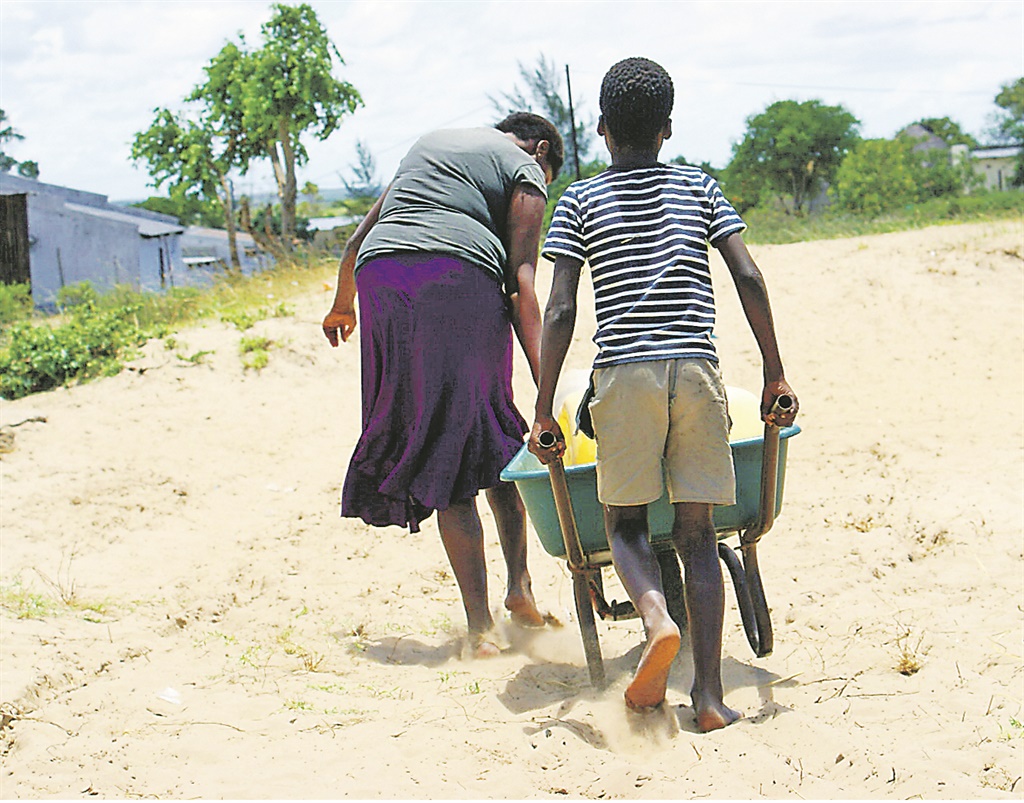
Despite heavy rains throughout the country over the past two weeks, 2015 was officially the driest year recorded by the SA Weather Service in 112 years.
Our annual rainfall is 608mm. Last year, we had 403mm.
The drought conditions, which have been in place since before the start of 2015’s rainy season, are hitting Zululand in KwaZulu-Natal ever harder, creating a market for water, with water entrepreneurs quickly cashing in.
And it is the poorest of the poor who are paying the price.
In Dukuduku and Kula, two villages near St Lucia, everyone with spare cash is rushing to sink a borehole. They then sell the water for between R2.50 and R6 a litre.
The residents, though, are not happy at having been forced into this position.
“People are prepared to pay this. Some houses have not had running water for six months,” said community leader Minnie Zikhali.
A resident in Kula, who wished to remain anonymous, said he had sunk a borehole by paying Mozambican water drillers a small fee to find a well on his property. He did not get the required permission from any authority.
“I have water; my neighbour does not,” he shrugged, adding he was making money out of selling water, “but not a lot”.
Both villages are filled with JoJo tanks, yet there is little sign of water harvesting.
“People use water tankers or municipal water – when it is flowing – to fill up their tanks,” said Zikhali.
Standing in a queue at functioning water points has become a daily chore for Zanele Dladla. She walks 2km every day to find water, and then carts it back to her home in Dukuduku village.
“It is a struggle for us in Dukuduku. Many of the water points have simply dried up.
“We have to buy water from those who have. And we pay between R5 and R6 to fill up our can,” she says.
“It is money we would use for food. Now we have to buy our water.”
She said the further away your house is from a regular watering point, the more you have to pay for water. “We pay more than the residents in Kula.”
In Dukuduku, water cans and containers decorate each water point. There is a constant flow of wheelbarrow traffic making its way here.
Dladla said she had been without water for several months.
But this week, the 33-year-old mother celebrated when the water started flowing – for now.
“The rain has been good. But it is not enough. I do not know for how long water will be available,” she said.
In Kula village, 11-year-old Nkosenhle Qwabe should be in school. Instead, he is collecting water.
“Most of us who have to collect water are children,” he said. “This afternoon after school, there will be lots of children here doing their water work. I come now to beat the queues.”
In the line behind Qwabe is gogo Dana Ntuli.
“I am glad today,” she said. “The water is flowing here.
“On other days, there is no water. Then we struggle. We wait for the water tankers to come. We wait and wait.”
In November, at the height of the drought, accusations surfaced that municipal officials managing the water trucks had started selling water to residents.
The Mercury reported drivers were charging residents in the uMkhanyakude District Municipality in northern KwaZulu-Natal R500 to fill up their JoJo tanks. The municipality promised to investigate.
The drought is causing tension in the area. Protesters in Mtubatuba blocked the N2 highway at the end of last year because of the water shortages. Residents here had not had a drop of water from their taps in two months.
In Jozini, protests had also erupted as a result of the shortages in November.
The provincial government estimates as many as 40 000 head of cattle might have died in the area from the drought so far.
uMkhanyakude spokesperson Mduduzi Dlamini said the uMfolozi River had dried up at the end of last year. But some rains have eased the situation for now.
“The drying up of the river has affected the water supply to the areas of Mtubatuba, St Lucia and Nkolokotho water-treatment plants, and caused water supply to be interrupted from time to time.”
He said despite the commissioning of additional boreholes, there was simply not enough water for the whole community.
Dlamini added that the municipality was in the process of implementing “a long-term intervention” to connect a bulk-water pipeline from Nsezi River to cover the area.
Residents in the area, however, said that while the drought was exacerbating the situation, the municipality’s malfunctioning infrastructure was one of the root causes of the water shortages. Pumps simply were not working in many areas, said Zikhali.
The department of cooperative governance and traditional affairs has allocated R91 million to the area for drought relief.




 Publications
Publications
 Partners
Partners








